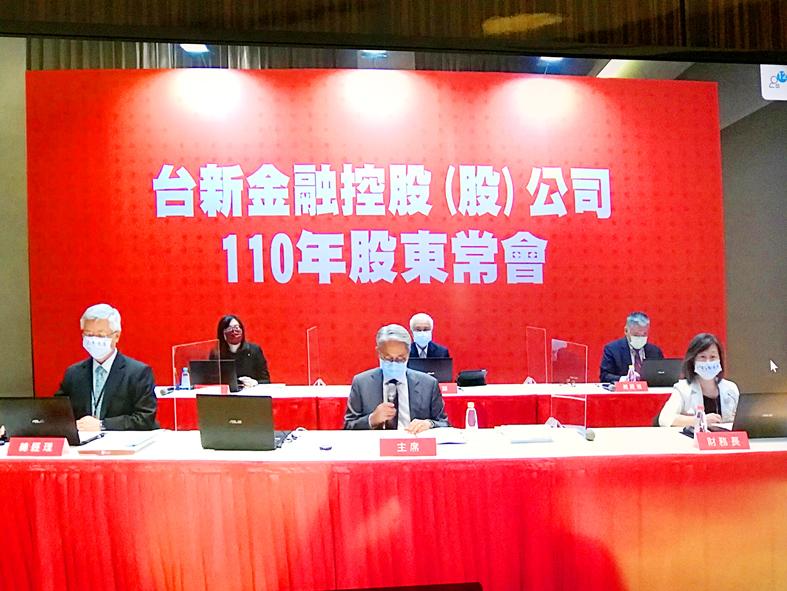Taishin Financial Holding Co (台新金控) once again yesterday urged the Ministry of Finance (MOF) to compensate it for a loss incurred when it invested in state-run Chang Hwa Commercial Bank (CHB, 彰化銀行), after the ministry rejected its request last week.
Taishin Financial on Friday asked the ministry to partially make up a NT$19.1 billion (US$680.4 million) loss from its investment in CHB, quoting Premier Su Tseng-chang (蘇貞昌) as saying that the “government would not let Taishin exit [CHB] with losses.”
However, the ministry rejected its request, saying that Taishin had earned a NT$266.2 billion return on its investment.

Photo: Chen Mei-ying, Taipei Times
While Taishin said that it lost NT$19.1 billion after CHB’s share price fell from the NT$26 per share that it paid when it bought 1.4 billion preferred shares in 2005, the ministry said that Taishin did not have a loss after factoring in the NT$10.9 billion it earned in cash dividends and the NT$15.6 billion in stock dividends.
“On June 10, Taishin sold 200 million shares of CHB at NT$15.58 per share, lower than the share’s closing price of NT$16.7 that day. It was Taishin that decided to sell its CHB shares at a lower price,” the ministry said in a statement yesterday. “So it is irrational for it to ask for government compensation.”
In a statement yesterday, Taishin said that it regretted to hear the ministry’s decision, adding that its calculations conformed to common business practice.
The ministry ignored costs that Taishin incurred when it issued debentures and preferred stocks to fund its purchase of CHB shares, the financial conglomerate said, adding that the ministry had never acknowledged its efforts to invest in the state-run bank, which it had done in response to government policy at the time.
Taishin said that a third party should step in to clarify the dispute between the company and the ministry, and to find a solution.
“We hope that the ministry will honor the premier’s instructions and treat us in a friendly manner so that we can find a win-win solution,” Taishin said.
However, the ministry said that according to accounting rules, the costs that Taishin mentioned should be viewed as expenses.
Taishin’s share price yesterday edged up 0.29 percent to NT$17.2 in Taipei trading, while CHB’s share price dipped 0.6 percent to NT$16.6, Taiwan Stock Exchange data showed.

China’s Huawei Technologies Co (華為) plans to start mass-producing its most advanced artificial intelligence (AI) chip in the first quarter of next year, even as it struggles to make enough chips due to US restrictions, two people familiar with the matter said. The telecoms conglomerate has sent samples of the Ascend 910C — its newest chip, meant to rival those made by US chipmaker Nvidia Corp — to some technology firms and started taking orders, the sources told Reuters. The 910C is being made by top Chinese contract chipmaker Semiconductor Manufacturing International Corp (SMIC, 中芯) on its N+2 process, but a lack

TECH BOOST: New TSMC wafer fabs in Arizona are to dramatically improve US advanced chip production, a report by market research firm TrendForce said With Taiwan Semiconductor Manufacturing Co (TSMC, 台積電) pouring large funds into Arizona, the US is expected to see an improvement in its status to become the second-largest maker of advanced semiconductors in 2027, Taipei-based market researcher TrendForce Corp (集邦科技) said in a report last week. TrendForce estimates the US would account for a 21 percent share in the global advanced integrated circuit (IC) production market by 2027, sharply up from the current 9 percent, as TSMC is investing US$65 billion to build three wafer fabs in Arizona, the report said. TrendForce defined the advanced chipmaking processes as the 7-nanometer process or more

NVIDIA PLATFORM: Hon Hai’s Mexican facility is to begin production early next year and a Taiwan site is to enter production next month, Nvidia wrote on its blog Hon Hai Precision Industry Co (鴻海精密), the world’s biggest electronics manufacturer, yesterday said it is expanding production capacity of artificial intelligence (AI) servers based on Nvidia Corp’s Blackwell chips in Taiwan, the US and Mexico to cope with rising demand. Hon Hai’s new AI-enabled factories are to use Nvidia’s Omnivores platform to create 3D digital twins to plan and simulate automated production lines at a factory in Hsinchu, the company said in a statement. Nvidia’s Omnivores platform is for developing industrial AI simulation applications and helps bring facilities online faster. Hon Hai’s Mexican facility is to begin production early next year and the

Who would not want a social media audience that grows without new content? During the three years she paused production of her short do-it-yourself (DIY) farmer’s lifestyle videos, Chinese vlogger Li Ziqi (李子柒), 34, has seen her YouTube subscribers increase to 20.2 million from about 14 million. While YouTube is banned in China, her fan base there — although not the size of YouTube’s MrBeast, who has 330 million subscribers — is close to 100 million across the country’s social media platforms Douyin (抖音), Sina Weibo (新浪微博) and Xiaohongshu (小紅書). When Li finally released new videos last week — ending what has